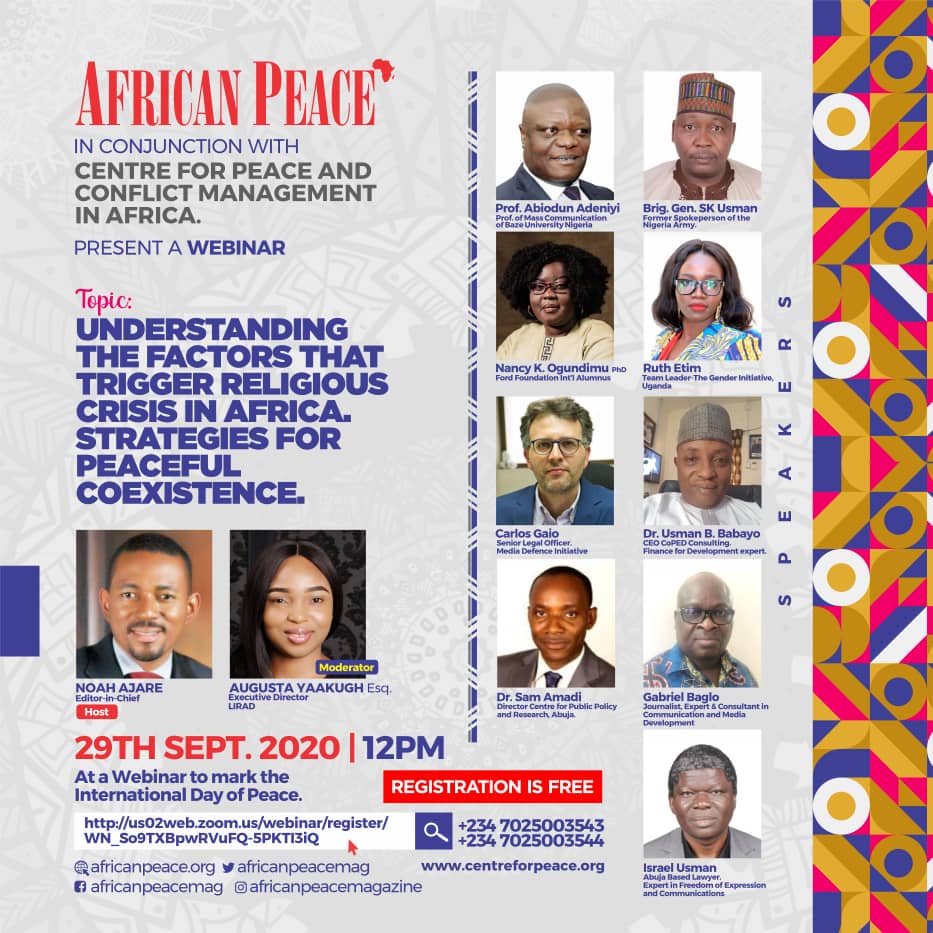

AFRICAN PEACE MAGAZINE IN CONJUNCTION WITH CENTRE FOR PEACE AND CONFLICT MANAGEMENT IN AFRICA
Cordially invites you to a webinar titled:
“Strategies for Peaceful Coexistence: Understanding the Causes and Factors that trigger Religious Crises”
Date: September 29, 2020
Time: 12:000 PM West Central Africa

Goals of the webinar:
- To expose participants to the immediate and remote causes and factors that trigger and sustain religious crises.
- To provide insights on the myriad consequences of religious intolerance.
- To fashion a framework for peaceful coexistence through proper understanding of the factors that inhibit same.
- To advance strategies for the promotion of peace, peaceful coexistence and religious tolerance.
- To sustain the discourse on coexistence diplomacy as well as integration of traditional and modern conflict management strategies.
Benefits:
- Free Membership of the Centre for Peace and Conflict Management in Africa
- Weekly Newsletters from Africa Peace Magazine
- Appreciable knowledge of:
- a) Factors that sustain the scale and intractability of religious crises
- b) Managing diversity and peaceful coexistence
- c) Religious tolerance, conflict management, and so much more…
Register in advance for this webinar:
https://us02web.zoom.us/webinar/register/WN_So9TXBpwRVuFQ-5PKTI3iQ
After registering, you will receive a confirmation email containing information about joining the webinar.
CONCEPT NOTE
The religious landscape of sub-Saharan Africa has changed dramatically. As of 1900, both Muslims and Christians were relatively small minorities in the region. The vast majority of people practiced traditional African religions, while adherents of Christianity and Islam combined made up less than a quarter of the population, according to historical estimates from the World Religion Database.
Since then, however, the number of Muslims living between the Sahara Desert and the Cape of Good Hope has increased more than 20-fold, rising from an estimated 11 million in 1900 to approximately 234 million in 2010. The number of Christians has grown even faster, soaring almost 70-fold from about 7 million to 470 million. Sub-Saharan Africa now is home to about one-in-five of all the Christians in the world (21%) and more than one-in-seven of the world’s Muslims (15%).
A study by a German academic, Matthias Basedau, says religious conflicts in sub-Saharan Africa have been on the rise for decades. Conflicts that have a religious dimension are becoming more common worldwide and sub-Saharan Africa is no exception. The region is generally vulnerable to conflicts because many states in sub-Saharan Africa are often weak. It also has to do with the fact that religious conflicts spill over from North Africa and the Middle East; either directly from Libya or Algeria or indirectly through the spread of more radical versions of Islam. However, religion is only one aspect of these conflicts – they can also be ethnic conflicts, or conflicts over power or resources. There is no conflict based purely on religion.
According to Genocide Watch, Nigeria has become a killing field of defenseless Christians. Reliable sources show that between 11,500 and 12,000 Christians have been massacred since June 2015 when the Buhari Government of Nigeria came to power. These statistics are based on careful records kept by church groups that include the names of victims and dates of their murders.
Jihadist Fulani Herdsmen accounted for 7,400 murders of Christians. Boko Haram committed 4000 killings of Christians. ‘Highway Bandits’ who separated Christians from Muslims on buses and then killed the Christians committed over 200 murders.
This webinar seeks to answer the following questions
* What are the causes of religious conflicts?
* Why are countries in sub-Saharan Africa so vulnerable to this kind of conflict?
* What role has globalization and social media played in increasing religious conflicts?
* What are the most practical alternative ways of enhancing the capacity of the inter-religious mediation group to effectively resolve religious conflicts?
* What strategies can be adopted for peaceful co-existence?
FOLLOW US ON SOCIAL MEDIA:
AFRICA PEACE MAGAZINE
Website: www.africanpeace.org
Twitter: www.twitter.com/africanpeacemag
Email: africanpeacemag@gmail.com
Facebook: https://web.facebook.com/africanpeacemag/
I.G: www.instagram.com/africanpeacemagazine
Linkedin: www.linkedin.com/company/african-peace-magazine-ltd
Website: www.centreforpeace.org
Twitter: www.twitter.com/cfpcma
Email: centreforpeace@gmail.com
Facebook: https://web.facebook.com/Centre-For-Peace-and-Conflict-Mgt-in-Africa
Linkedin: https://www.linkedin.com/company/centre-for-peace-and-conflict-management-in-africa
